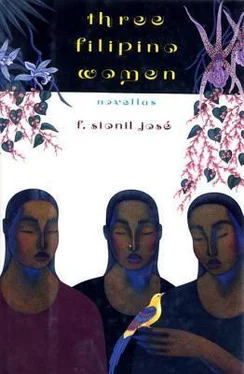Francisco Jose - Three Filipino Women
Здесь есть возможность читать онлайн «Francisco Jose - Three Filipino Women» весь текст электронной книги совершенно бесплатно (целиком полную версию без сокращений). В некоторых случаях можно слушать аудио, скачать через торрент в формате fb2 и присутствует краткое содержание. Год выпуска: 2013, ISBN: 2013, Издательство: Random House Publishing Group, Жанр: Современная проза, на английском языке. Описание произведения, (предисловие) а так же отзывы посетителей доступны на портале библиотеки ЛибКат.
- Название:Three Filipino Women
- Автор:
- Издательство:Random House Publishing Group
- Жанр:
- Год:2013
- ISBN:978-0-307-83028-9
- Рейтинг книги:4 / 5. Голосов: 1
-
Избранное:Добавить в избранное
- Отзывы:
-
Ваша оценка:
- 80
- 1
- 2
- 3
- 4
- 5
Three Filipino Women: краткое содержание, описание и аннотация
Предлагаем к чтению аннотацию, описание, краткое содержание или предисловие (зависит от того, что написал сам автор книги «Three Filipino Women»). Если вы не нашли необходимую информацию о книге — напишите в комментариях, мы постараемся отыскать её.
and
-examine the Philippine experience through the lives of three female characters, a prostitute, a student activist, and a politician.
Three Filipino Women — читать онлайн бесплатно полную книгу (весь текст) целиком
Ниже представлен текст книги, разбитый по страницам. Система сохранения места последней прочитанной страницы, позволяет с удобством читать онлайн бесплатно книгу «Three Filipino Women», без необходимости каждый раз заново искать на чём Вы остановились. Поставьте закладку, и сможете в любой момент перейти на страницу, на которой закончили чтение.
Интервал:
Закладка:
We moved to Santa Mesa without ceremony. She enjoyed decorating the two-bedroom apartment. She bought the drapes in Divisoria — light green fabrics that went very well with the furniture. She also bought the appliances and started learning how to “cook Spanish” to please me. I went to her father and we had a long talk. I assured him the church wedding would be very soon. I could tell that he was glad Malu was with me, that I would snatch her away from the crowd that threatened to push her to an anonymous and lonely end. Her mother came and looked at our place. She brought a lot of linens and saw to it that our refrigerator was always stocked. She also sent one of her maids to help, but Malu did not want her to sleep in the apartment; she wanted just the two of us since it was not difficult, she said, to keep house.
My night out was Saturday and hers was Sunday. I felt awkward at first, going out alone, and in time I did see a former girlfriend. I visited my old haunts in Ermita and wandered along the boulevard, but always, a feeling of guilt hounded me as if I was shutting out a part of myself from her, which was not what I wanted for I longed to share everything with her — my time, my possessions. In the end, I gave up going out alone.
She continued, however, to go out every Sunday night. Sometimes, she returned just before daybreak. I would lie awake waiting for the taxi or the car that would bring her home, pretending I was asleep, listening to her undress and finally cuddle close to me, her breath smelling not of wine or of cigarettes but of the same familiar scent. I was curious and jealous every time I heard a man outside saying good night, although sometimes it was a woman, for I always peered out and watched but did not ask.
I went to Cebu every so often to check up on our subsidiary there and called her twice a day, sometimes three, just to hear her voice. If she was not in the apartment, she was in school. Sometimes, we would be unable to connect because she was calling me.
We continued the little debates; I asked her once what her group was doing now and she said, “Don’t bother your reactionary head with proletarian politics.”
I reminded her again that it was not a crime to be wealthy. I cited how our employees were getting much more than the minimum wage, that they had health and insurance benefits and paid vacations without their asking.
“Paternalism,” she said, cutting me short.
No matter, it was a year of blessed happiness which flitted by so quickly that I was hardly aware of the time passing.
I wanted her pregnant so that she would, by force of circumstance, be cut off from all those demonstrations that have now become massive, intermittent, and fraught with danger. All the shops in Ermita were now boarded with plywood and the electric posts and embankments all over downtown Manila screamed with the posters of revolution. Chaos pervaded the universities and classes were haphazard and often suspended.
With my motive urging me on, there was no night that we did not embrace. When a long weekend came, we motored to Baguio. Our house, which we seldom used except during Holy Week or when we had guests, frightened her a bit … six rooms upstairs and two downstairs and we were the only occupants because Mang Pedring, the caretaker, and his family had their own quarters above the garage in the rear. We turned on all the lights.
It must have been the Baguio cold, and remembering our first night there afterwards, she said, “ Dios ko , the whole night. I was never so tired in all my life.”
A month after our short vacation, she was pregnant. She could not believe it; she waited for the second month. She consulted three doctors and all the tests were positive. I was ecstatic.
I bought several books on prenatal care and continually asked Mother’s advice. Malu’s parents were very happy, too, and they often asked when we were finally going to be married in church.
We discussed it once; if we did not get married, her baby would be a bastard. She thought it was very funny, but I did not. “We will have it simultaneously then,” she said gaily. “First the wedding, then the baptism.”
I looked after her diet carefully and worried that she might start smoking. I told her that whatever she took in, her baby would take it, too. That early, I started buying baby things — diapers, baby powder, safety pins. She said it was all too soon, her stomach did not even show. It was noticeable to me, though, and soon her belt would no longer buckle. She took to wearing larger blouses. She went to school much later and came home earlier. She had cut down some of her activities, even her visits to the spiritista chapel in Navotas. But her Sunday evenings were still hers and she kept them all.
One evening, after she had returned from her “free” night out, we talked about the baby’s name. I meant it as a joke when I asked, “Are you sure it is mine?”
She glared at me. “Now, what the hell do you mean by that?”
I was still in a joking mood, but I suppose my niggling doubts came through. “Oh, your Sunday nights, you know.”
She turned away and in a while, she was shaking violently and when I went to her, sobs were torn out of her in anguish and bitterness. I cradled her in my arms, kissed her hair, assured her that I knew I should not have even hinted that I did not trust her.
I don’t really know what happened. She was under expert medical care and I tried my best to make allowances for her moods. Could it be that what I had said bothered her so much? Could it have been caused by the disappearance of many of her friends? At the end of the third month, she started bleeding one afternoon after she got back from school. I rushed her to the hospital where she stayed for a week after she lost her baby, then another two weeks in bed at home to regain her strength before the doctor permitted her to move about.
Now, she was listless and there were times when she was cold to me. I could sense that she was blaming me for the loss. There was milk in her breasts — they were no longer “as small as kalamansi. ” The loss of her baby — it was a boy — was a deep affliction of the soul and I consoled her by saying we could always return to Baguio. We were, as a matter of fact, planning it. I was anxious that she become pregnant again and the doctor said there would be no problem, but that we should be more careful now.
We were to leave that morning. But the papers did not appear and there was no radio either. Something was wrong — so we did not move. When martial law was finally announced on TV, Malu was white-faced. She made some hasty phone calls and talked guardedly. By midday, she said she would go to the university. All she took was her handbag. When she did not return in the afternoon, I called her department. They had not seen her. In the evening, I hurried to Dasmariñas; her parents had not heard from her either. A week later, I received a letter postmarked Manila.
My Precious Teng-ga,
I am very sorry that I had to leave without explanation, without good-bye. Please believe me when I say that I love you and that I will always love you. But duty calls and I have to go. If I don’t see you again, just remember that I have always been true. Please forgive me.
Plat
I realized then that she had not abandoned the cause and that it was far more important than I.
Without Malu, I should not have remained in the apartment but I did, hoping she would return. I could not attend fully to our business, but fortunately, we had hired good people. Oh, so many hours alone, going over her books, the papers she wrote, bringing out her clothes, rearranging them in the cabinet — the old and faded jeans, the battered sneakers, and the cotton blouses.
Читать дальшеИнтервал:
Закладка:
Похожие книги на «Three Filipino Women»
Представляем Вашему вниманию похожие книги на «Three Filipino Women» списком для выбора. Мы отобрали схожую по названию и смыслу литературу в надежде предоставить читателям больше вариантов отыскать новые, интересные, ещё непрочитанные произведения.
Обсуждение, отзывы о книге «Three Filipino Women» и просто собственные мнения читателей. Оставьте ваши комментарии, напишите, что Вы думаете о произведении, его смысле или главных героях. Укажите что конкретно понравилось, а что нет, и почему Вы так считаете.












